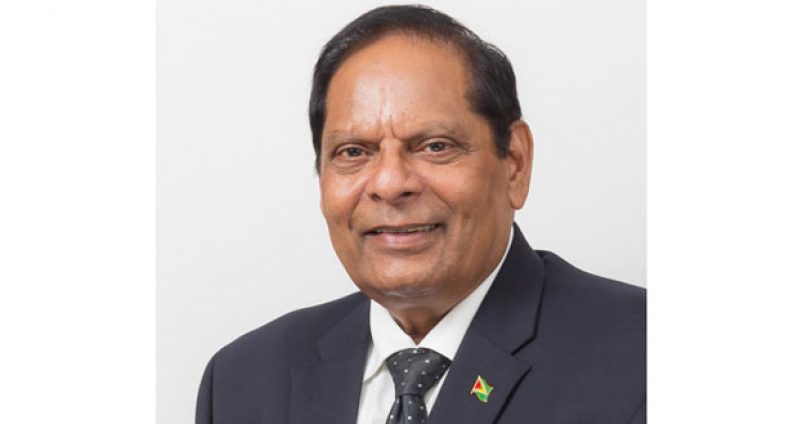…gov’t mulls investigative, prosecutorial arms
By Ariana Gordon
GOVERNMENT is keen on strengthening the Integrity Commission with investigative and prosecutorial powers, Prime Minister with responsibility for governance, Moses Nagamootoo has said. He said too that the administration is also looking to create a mechanism through which the constitutional body could have oversight at the level of the National Assembly. Nagamotoo made the comments to the Guyana Chronicle last week, noting that the role of the body in ensuring the declaration of assets by public officials cannot be underestimated.
He said since the establishment of the Integrity Commission Act in 1997, the commission has been in many ways “a toothless poodle.” He said “It has a lot of bark and no teeth,” noting that it is critical that such an important commission has a policing aspect that allows for the investigation and prosecution of public officials who either do not declare their assets, or are found to be in violation of the law.
Currently, Prime Minister Nagamootoo is examining recommendations for amendment of the Integrity law. He said the proposed amendments are relative to the creation of an investigative unit, a prosecution unit, as well as the creation of a consultative mechanism in the National Assembly that allows for the Integrity Commission to make periodic reports to Parliament.
“…there should be a parliamentary oversight committee to ensure that the Integrity Commission would fulfill that role of making reports,” the Prime Minister told the Guyana Chronicle. As such, the Prime Minister said, he will be approaching Cabinet shortly with the recommendations that have been made for amendment of the legislation.
He noted that it is the commission’s responsibility to have in place a reformed Code of Conduct for public officials. He added that incorporated in the law will be new Code of Conduct that sets the guide for the behaviour of persons in public office. Asked whether the opposition People’s Progressive Party/Civic (PPP/C) will be consulted during this process, the Prime Minister said when the amendments are formulated and taken to Parliament, the opposition will be included in vetting of the amendments.
“We need to have consensus on this issue of reforming the Integrity Legislation and strengthening the code of conduct and the enforcement mechanism,” he told the Guyana Chronicle. “I believe that all political parties in Guyana have one thing in common, we all want to stamp out corruption,—it would make our politics cleaner, governance better…” he continued.
Recently, President David Granger said the Integrity Commission is likely to become fully functional before the end of the year, and noted that government is working to ensure that there are functional laws and a strong organisational structure established before the commission can function effectively.
During the recording of the Ministry of the Presidency’s weekly televised programme, ‘the Public Interest,’ President Granger told reporters that what was inherited from the former People’s Progressive Party (PPP) administration is “unworkable.”
Though he could not provide a specific timeline as to when the Integrity Commission will become functional, the President said there has to be “tightening” of the legislation to ensure that those who are found guilty of committing illegal acts while in public office are prosecuted.
“We are working on the legislation, it will be brought to cabinet, and I expect that before the end of this year there will be a functioning Integrity Commission,” said President Granger. The Integrity Commission, the President said, was a “poorly funded” and dysfunctional organisation. “We are going to create functional laws; functional organisation structure, and I expect that by the end of this year, when Parliament resumes in October, we’d be able to bring that legislation before the National Assembly. Give us time,” he remarked.
President Granger likened the functioning of the Integrity Commission in the past to that of a post office, where persons submitted their returns but no action was taken. “There was a perception that the PPP was using the Integrity Commission as a means, rather than preventing corruption, of checking people’s personal finances,” said the President.
The Integrity Commission Act provides for the establishment of the Integrity Commission and provides for the appointment of a Chairman to head the commission, not less than two (2) and not more than four (4) other members of the commission, a secretary to oversee the day-to-day work of the commission, and other officers for the proper performance of the commission.
The Chairman of the Commission should be a person who is or who was qualified to be a Puisne Judge of the High Court, or any other fit and proper person; and the other members must appear to the President as having experience and showing capacity in law, public administration, social service, finance or accountancy or any other discipline.
The Integrity Commission has been the subject of much debate in the past, despite the fact that the previous administration had sworn in members in 1999. Chairman of the Commission at the time, Bishop Randolph George (now deceased), resigned in 2006. Since then, the commission has been without a chair. The coalition government, while in opposition, had promised to have an autonomous Integrity Commission installed as a matter of priority.



.jpg)








